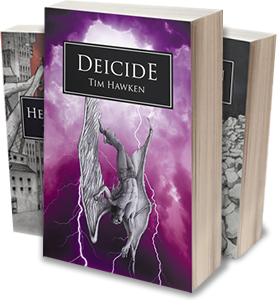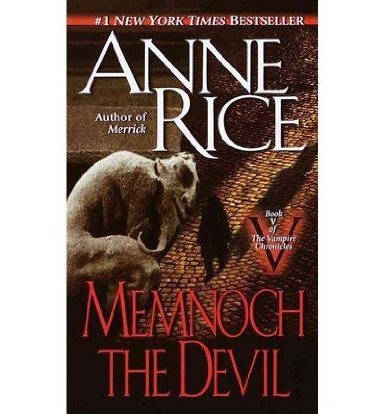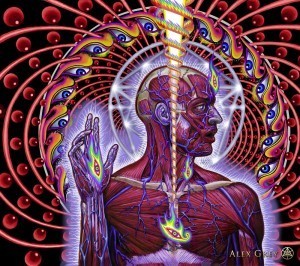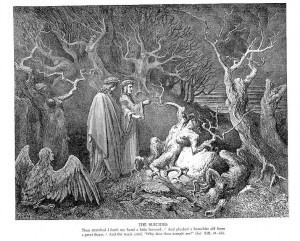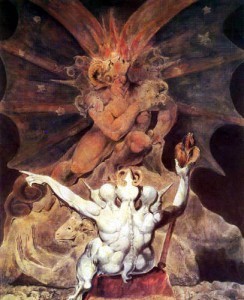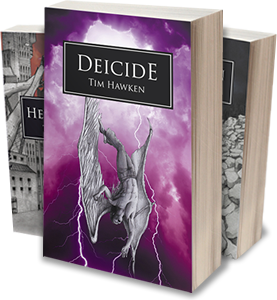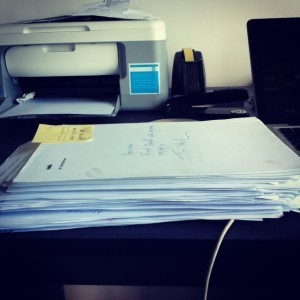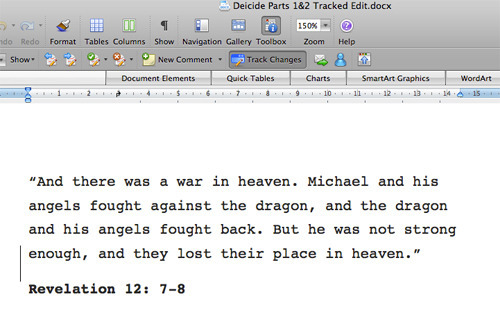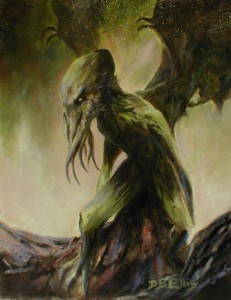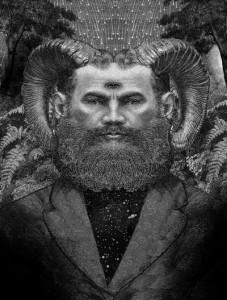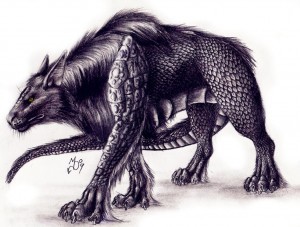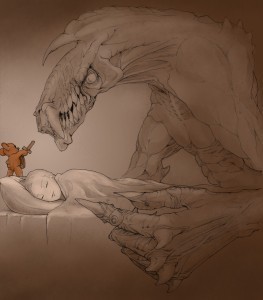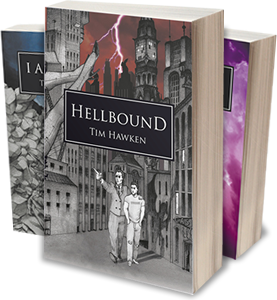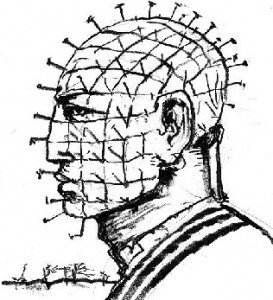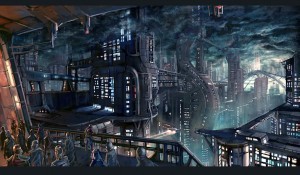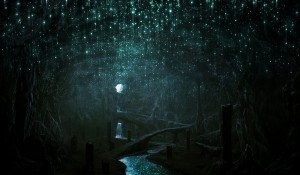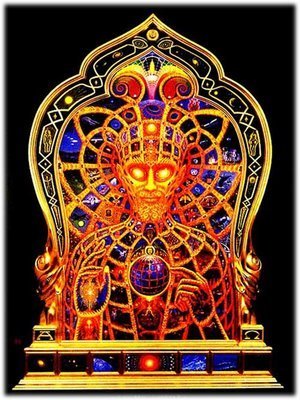Tim Hawken's Blog, page 8
January 7, 2014
Over The Edge of Eternity
To kick off 2014 I will be serializing my new novel, Over The Edge of Eternity, for free on Medium.com over the next few months.
The novel is a huge departure from the Hellbound trilogy, so I’m giving fans the opportunity to dip into the story in a fun and easy way. Installments will be posted online each Monday and Friday in Medium’s ‘Book Ends’ collection.
This is the blurb for the work:
MATT is alone, depressed and working a dead-end job. When he is fired for incompetence, thoughts of suicide come to the fore. The only thing that stops him is the promise of a more interesting existence, where he decides to cast worthless rules aside and live how he sees fit.
Running red lights, stealing fish n’ chip orders and stalking the supermarket for unattended grocery trolleys, Matt’s life rises to something above the mundane. His escapades lead him to meet a quirky girl, Jess, who drags him into a world of love, philosophy and exciting sex.
Over The Edge of Eternity is a work of literary fiction about love, depression, cancer, and the will to live. Set amongst an Australian coastal town, it will make you question how you live your life. Its raw emotion is at once heart shattering and uplifting.
Read Chapter 1 here now.
A new Tim Hawken novel, free on Medium
Tim has just announced that he will be serializing his new novel, Over The Edge of Eternity, for free on Medium.com over the next few months.
Readers will be able to take in new chapters each Monday and Friday. To read a blurb and chapter one now click here.
November 26, 2013
The Final Intstalment in The Hellbound Trilogy, Out NOW!
AN EPIC TALE OF BIBLICAL PROPORTIONS
“Sitting in the war-rooms at Casa Diablo, my closest allies surrounded me. Could I trust them all?”
Finally reunited with his love Charlotte, Michael has taken control of Hell. Yet the insane god Asmodeus still rules Heaven, and the division between realms continues to oppress the lost souls of the afterlife. With the help of his wife and friends, Michael’s aim is to create true freedom for all, ending Asmodeus’ tyrannous reign.
However, the chance of betrayal by someone close within his fold weighs heavily on Michael’s mind, as does the burning question that not even the all-knowing Perceptionist can answer:
How do you kill the unkillable?
Deicide is the stunning conclusion of Tim Hawken’s Hellbound trilogy. Get your copy at your favourite book retatiler today. Amazon has stock ready to go for Satan’s stockings here.
November 15, 2013
Weekly Inspiration – Hellbound
Weekly Inspiration – Hellbound
Considering the final instalment of the Hellbound Trilogy has just been released, it feels like a fun time to go back to the beginning of how the whole story was inspired. Orginally the first novel began as a university assignment when I was majoring in literature. The task was to ‘create a contemporary Satan’. From there it evolved into its own twisted beast, but here are three major contributors to how it took shape: Literature, Art and Music.
*warning, this blog contains spoilers if you haven’t read the first title in the Hellbound Trilogy.
1. LITERATURE
As an avid reader, many things I have absorbed over the years have influenced my writing. However, there are some very key texts that are particular to Hellbound, which deserve mention. They are: Paradise Lost by John Milton, Inferno by Dante, and Memnoch the Devil by Anne Rice. The first two are classics. Especially Dante has almost single-handedly defined the fire and brimstore version of Hell we see today. More of this in art. Students of Milton might notice some sneaky homages to his masterwork scattered through my novels. Yet it was Memnoch the Devil, which I was reading right around when the original university paper cropped up, that most helped shape the plot of Hellbound. Anne Rice’s love affair with gothic and renaissance art, her vision of ‘Hell as Purgatory’, and her idea that perhaps Satan may be searching for someone to take over his role of soul cleanser, all play a big part in my first novel. Of course ‘Hell as Purgatory’ is hardly an original concept and neither is a successor of Hell’s rule. Still, I must nod my head at that book to say this was the first work in which I personally had encountered such themes. If you haven’t read The Vampire Chronicles in full, I urge you to do it. They make Twilight look like Spot The Dog in comparison.
2. ART
Gustave Dore, William Blake, Alex Grey and various graphic novels all helped inspire the ‘new’ version of Hell you see in the Trilogy. Rather than list a huge list of paintings. Here are three which sparked imagination.
Alex Grey’s album cover art for Lateralus was a key inspiration behind the character of The Perceptionist. (click to enlargen)
The Suicides by Gustave Dore. Dore’s depictions of Dante’s Inferno are, for me, some of the greatest artworks in history. The skill of his etchings are stunning. Other works like ‘White Rose’ are also ones to check out. This particular work helped form the vision of Mount Belial’s ‘Forest of the Damned’.
Depending on your memory, you may recall this painting is actually hanging in the foyer of Casa Diablo inside a solid diamond frame. It’s hard to pick just one of Blake’s paintings, but I love the depth of this one. His writing is also pure genius.
3. MUSIC
Music heals all emotions. It can enflame them too, if you take the right elixir. I’m one of those strange people who write with headphones blaring to drown out the distraction of the ‘real world’. During the development of the Hellbound Trilogy I listened almost exclusively to Tool when writing. Their raw feeling can’t be matched and Maynard’s Keenan’s voic doesn’t distract from the music, it adds to it. Saying all that, there’s another song which had an even larger impact on the plot of Hellbound at large: Heart Attack & Vine by Tom Waits. Yes, a bit left of centre, but the line
“don’t you know there ain’t no devil, there’s just God when he’s drunk”
helped me imagine the split personality of Asmodeus. It’s hard to argue a more pivotal role in the novel. On that note, I leave you with the fine notes of Mr. Waits. Enjoy….
Deicide Pre-release on Kindle
The third book in the Hellbound Trilogy has just been released on Kindle only.
To get your copy go to Amazon.com or Amazon.uk.
Full release for print will be announced shortly.
It ends now!
November 12, 2013
5 Simple Editing Tips
5 Simple Editing Tips
To paraphrase the late great David Rakoff, editing is like pulling teeth. From your dick.
After letting the creative juices flow out of you like hot blood from a stab wound, it can be soul destroying to tear your word-baby apart limb by limb. But, it’s worth it. Even if you’re a professional and have someone to help, editing your own work is a must. In the electronic age of ‘write, click, post’, you look even more professional if what you put out in the world is polished.
When I started writing, I was TERRIBLE at editing. My mind goes faster than my fingers or eyes, so I ended up skimming and missing obvious mistakes. I’m still far from perfect; anyone who has received an email from me will know this. But, I’ve found that a few simple tricks can help a lot for those who are unsure where to start.
1. Change Fonts.
I tend to write and publish in either Cambria or Arial, because they look nicer. However, I always edit in Courier. Why? It’s a font that gives the same amount of space to each character, so you’re less likely to miss things, which are otherwise squashed together.
2. Change Formatting
There’s a reason most publishing houses ask you to at least have 1.5 spacing when submitting. It’s easier for them to spot mistakes too. To spread things out even further, double space your work and either set a larger font size or increase the view % in your word doc. Bigger is better. Space and size mean mistakes are easier to spot. Thanks to computer technology it’s easy to flip things around for a fresh view.
3. Leave Some Time Between Writing and Editing
Some people say read things backwards to take the writing out of context. I kind of think that’s silly. Spellcheck will weed out genuine spelling errors of ‘non-words’. However things like except/expect, solider/soldier, they’re/their/there, and so on, won’t be picked up by regular software. They need to be read in context of what you’re hoping to articulate. If something isn’t time sensitive, leave it for at least a couple of weeks before reading again. You’ll forget exactly what you were saying and ‘fresh eyes’ will better spot mistakes and clumsy sentences.
4. Read It Out Loud.
A lot of editors and even school teachers will tell you this one. Do it. Most people don’t, no matter how often they’ve been told, because they think they look silly. Who cares? Lock yourself in your bedroom if you have to, or better yet, read it to someone you’re comfortable around. You’ll be amazed at the amount of things that sound odd when put into spoken word. It will also help you better place punctuation with natural pauses in speaking.
5. Pay someone else to do it.
Remember the old saying, “If you want something done properly you have to do it yourself?” I realised that was bullshit when watching my Dad ‘fix’ our lawnmower every second weekend as a child. Hire someone who knows what they’re doing. It will save time and heartache in the long term for the projects you care about most. There are lots of great professional services out there who are well-priced. Just don’t get sucked in to going ultra cheap and let quality suffer because of it. Always seek recommendations from Writer’s Centres in your closest capital city for the best options.
If you think this fifth tip is cheating, or don’t want to fork out the cash, an alternative tip is: repeat steps 1-4. Read it again and again. And again.
November 5, 2013
Weekly Inspiration – Chimeras
When searching for inspiration of otherworldly creatures I turn to art blogs and sources like Deviantart. There’s nothing like a good Chimera to get my blood tingling in my veins and the muse singing in my ears. Here’s a few I found this week when trying to kickstart some ideas for my new book…….
Cthulhu. If you need an explanation, stop now and read this by H.P. Lovecraft. I love this oil version by David Ellis.
Dan Hillier‘s engravings are simply amazing. Here’s an new one from him titled Wayfarer.
A trio of freaky creatures by Riyahd.
A Chimera from MasterDragon09 on Deviantart. He has a few very nice sketches in addition to this, worth checking out.
Love this vision by Begemott
October 29, 2013
How To Write A Novel
How to write a novel…
I often get asked questions along the lines of “what’s your process for writing a book?”
Here are my personal tips to get writing and, most importantly, give yourself the best chance of finishing what you’ve started.
1. Decide on a theme
The first thing you’ll be asked by any prospective editor is “what is your book about?”. You need to have a good answer; one that you can ejaculate clearly in a few sentences or less. This is the same when you start writing. It can’t be about nothing, Seinfeld has done that already. This will of course evolve as your story does, but it is best to start simply. For Hellbound, the theme was ‘a love story set in a contemporary Hell.’
2. Decide on a location
Where you set your story is going to have massive implications on who your characters are and how they react to their environment. ‘When’ can also be added in here, for example: a long time ago in a galaxy far, far away.
3. Get to know your characters
It would be a strange book without any characters in it. Some will pop up as you go, but you should at the very least know who your main two characters are and how they interact with each other. Personality, looks, odd habits: the more specific you are the better. They will soon take on a life of their own and help write the story for you. Some people, like Clive Barker, actually sketch characters first, so they become real in their minds.
4. Outline the story into 3 acts
Parts 1, 2 and 3. This is a formulaic way of writing, proven to maintain structure. You might think it’s mechanical, but when you’ve written 200,000 words and the story hasn’t progressed, you’ll be kicking yourself you didn’t have at least a simple plan.
5. Decide on sub-themes
Books are a platform to explore key issues within society. Love, hate, racism, homosexuality, depression, or how you’d react to the pending zombie apocalypse. The best novels speak to us on multiple levels. This is your stage, shout your complex views from it and then contradict them, just for fun. For the Hellbound Trilogy I explored themes from sin and utilitarianism all the way to how to best drink a cup of tea (not too much sugar).
6. Create a chapter summary for the entire book.
This follows on from your ‘3 acts’. Again, this will change, but figure out how you’ll get from point A to B, when you’ll introduce characters, or drop a twist on your reader’s heads. This is your roadmap. I keep mine at the bottom of the manuscript so I can add or subtract notes as I go along. Without this, I’d get totally lost in tangents about things that don’t matter.
7. Write the opening lines.
The first sentences of a book can decide whether someone will go on to read the next thousand lines or so. Hone it. Make it sizzle. If it doesn’t yet, you can refine during editing, but it has to entice. Here’s an example from a book I’m working on right now: The neon dawn shone through the window. It was the city that made the light. There was no sun.

The beginning of Fight Club
This a great article on the power of opening sentences, by Mark Rubenstein.
8. Write the ending.
You need to end with a bang, but more importantly it will motivate you to finish. I find that if I have on paper exactly how something will conclude it’s easier to fill the gaps in between.
9. Begin at the beginning and go on till you come to the end; then stop.
Some of you will know that this is a Lewis Carol quote. It makes sense. Don’t get lost in writing bits and pieces and trying to shoehorn them in somehow. If you go from start to end then the story will flow much better. Should inspiration strike for a later part, you can write it and use your chapter summary to slot it in, but don’t get distracted by things that aren’t relevant to this book.
10. Edit, Edit, Edit.
The editing process is painful. It’s like slicing away bits of your own flesh. Mostly it’s warts, but sometimes it can feel like you’re amputating a limb. Here is an article from The Guardian on this subject. There are many more others out there like it. They aren’t flogging this horse because it’s dead.
So, now your book is written and edited. Hurrah! Now it’s time for the real hard work. How do you get published?
October 20, 2013
Weekly Inspiration – Dark Dreams
Weekly Inspiration
Images inspire a lot of things for me. Sometimes, they’re video clips, sometimes stills.
This week I have been doing research for a new novella with a theme of ‘dark and dreams versus light and reality’. Here are a few nuggets of gold that moved my imagination. Click the shots to enlargen.
Ice Night on Behance
Cave of Eternal Night by Vlad Marica
Cosmic Christ by Alex Grey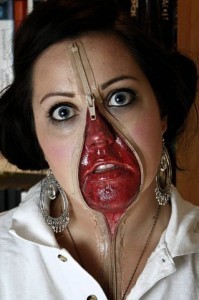
Best Halloween Costume Ever?
October 9, 2013
Deicide to Launch Amid Film Buzz
There have been quite a few movements on the Hellbound front this year. Not only have I been busy writing Deicide, the final installment of the trilogy, but have also signed with two production companies to help bring Hellbound to the silver screen.
Actor Charlie Bewley has been instrumental in this. He has been attached to play Michael in the film.
For full info, here is the offical press release:
Final Instalment of Hellbound Trilogy to Launch Amid Movie Buzz
The third and final book in Tim Hawken’s Hellbound Trilogy is set for release this December, amid development of a film franchise for the series. Titled Deicide, the novel concludes the epic story, which depicts a world of Hell never seen before.
Early critical acclaim and a strong cult following for Hellbound meant Hawken’s work captured the attention of Hollywood right from the start. The author has recently signed partnerships with both Luber Roklin Entertainment and Savela/Kabatoff Productions to help bring his vision to the silver screen. In addition, actor Charlie Bewley (Twilight, Vampire Diaries, Hammer of the Gods) has been attached to play the lead character of Michael in the films.
“I found out about Hellbound when a friend gave me the first book,” Bewley said of the trilogy. “I knew right away I wanted to play Michael. Hawken’s dark genius leaps off the page in a visceral way. It grabs you and shakes you up, leaving you thinking about it for months afterward. This is the next big thing in the supernatural genre. The struggle for redemption in a dark world is something that resonates with everyone it touches.”
Ken Kabatoff of Savela/Kabatoff Productions also expressed his excitement at being involved with the Hellbound franchise. “This was an easy decision for us to make. Tim’s series is as enticing as the forbidden fruit itself. It has alluring visuals, crisp dialogue and an invigorating story, all staged in an ancient setting, which Hawken has turned on its head. It’s going to make one amazing film.”
Hawken himself remains humble about the attention his work has received to date. “When you first write something like this, you really don’t know how it’s going to be received. Being a previously unknown author from Australia, I still pinch myself that so many people have shown confidence in my work, right from my publishers, to the fans and now to filmmakers and actors. It’s crazy. The next step is bringing a major studio on board, but with the team of people behind Hellbound now, it feels like the momentum is only getting stronger. It’s a very good atmosphere to be launching the last novel in. Deicide is going to lift it to the next level and end with a bang!”
Deicide will be available from all good book retailers, in both paperback and ebook formats from early December, via Rethink Press.
Charlie Bewley to play Michael

